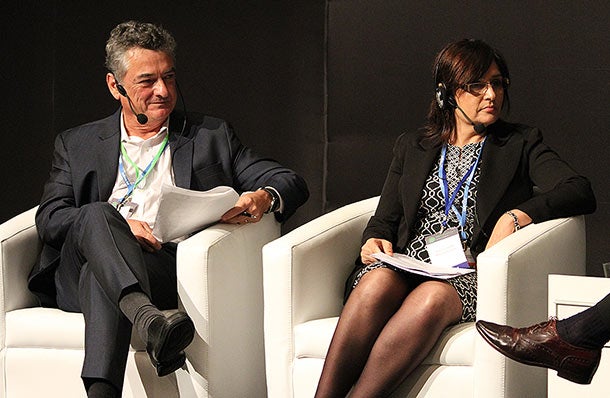
Lima, 8 December 2014 - The GEF-hosted discussion on commodity-driven deforestation at the Global Landscape Forum in Lima, Peru, gathered public and private sector key players this past Saturday, December 7.
The GEF CEO Naoko Ishii introduced the GEF's Integrated Program on Removing Deforestation from Commodity Supply Chains, a $45 million pilot that a consortium of GEF agencies is currently developing.
Gustavo Fonseca, GEF’s Director of Programs, moderated discussion between Paraguay Minister for the Environment Cristina Morales, Credit Suisse's Mark Burrows, and Unilever's Thomas Lingard.

LR: Gustavo Fonseca, Director of Programs (GEF); Cristina Morales, Minister of Environment (Paraguay)
The panelists discussed how production of commodities that avoids deforestation can be mainstreamed, including ways the governments, private sector, civil society, and donors can jointly accelerate change towards low-carbon sustainable development.
“Projections indicate that global demand for soy, palm oil, and beef could increase by 50% in the next decade or two. We simply must find a way to meet this demand without having to remove the world’s remaining forests,” said GEF CEO Naoko Ishii.

burrows.jpg
|

Naoko-commodities.jpg
|

uniliver-commodities.jpg
|
| Mark Burrows (Credit Suisse) | Naoko Ishii, CEO (GEF) | Thomas Lingard (Uniliver) |
The discussion touched upon the importance of capitalizing on the recent commitments of governments and private sector to change supply dynamics and the production of commodities. Panel members highlighted the contributions of the many different players involved. These include governments of recipient countries, governments of consuming countries, producers, financial institutions, indigenous people and smallholders, civil society, traders and buyers.
"Systemic problems require systemic solutions, as those promoted by the commodities integrated approach pilot," said Gustavo Fonseca, Director of Programs at the GEF.
Talking about the role of the finance sector in the supply chain, Mark Burrows underscored that availability of resources is usually not an issue. However, he also pointed out that the private sector needs to see sustainable development as an opportunity and not a risk in order to become interested in changing the way they do business.
“70% of tropical deforestation is driven by conversion of land for production of global commodities. Without reducing tropical deforestation dramatically, reaching the targets needed to achieve climate stability becomes very difficult,” Naoko Ishii concluded.
The panel also emphasized the need to enhance levels of cooperation and coordination required for a transformational effect on world-spanning, multi-player supply chains. Bringing these different players together to constructively and collaboratively discuss issues and options is therefore crucial to identify solutions and ways forward.


